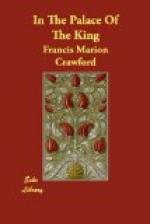She had forgotten the existence of Inez, whom she had rarely seen, and never noticed, though she knew that Mendoza had a blind daughter.
“It is I—the Princess of Eboli,” she answered in the same gentle tone.
“Hush! Whisper to me.”
“Your father has gone back to his duty, my dear—you need not be afraid.”
“Yes, but Eudaldo is outside—he hears everything when he is not asleep. What is it, Princess? Why are you here?”
“I wish to talk with you a little,” replied Dona Ana, whispering now, to please the girl. “Can we not get a light? Why did you put out the lamp? I thought you were in another room.”
“I was frightened. I did not know who you were. We can talk in the dark, if you do not mind. I will lead you to a chair. I know just where everything is in this room.”
The Princess suffered herself to be led a few steps, and presently she felt herself gently pushed into a seat. She was surprised, but realizing the girl’s fear of her father, she thought it best to humour her. So far Inez had said nothing that could lead her visitor to suppose that she was not Dolores. Intimate as the devoted sisters were, Inez knew almost as much of the Princess as Dolores herself; the two girls were of the same height, and so long as the conversation was carried on in whispers, there was no possibility of detection by speech alone. The quick-witted blind girl reflected that it was strange if Dona Ana had not seen Dolores, who must have been with the court the whole evening, and she feared some harm. That being the case, her first impulse was to help her sister if possible, but so long as she was a prisoner in Dolores’ place, she could do nothing, and she resolved that the Princess should help her to escape.
Dona Ana began to speak quickly and fluently in the dark. She said that she knew the girl’s position, and had long known how tenderly she loved Don John of Austria, and was loved by him. She sympathized deeply with them both, and meant to do all in her power to help them. Then she told how she had missed Dolores at court that night.
Inez started involuntarily and drew her breath quickly, but Dona Ana thought it natural that Dolores should give some expression to the disappointment she must have felt at being shut up a prisoner on such an occasion, when all the court was assembled to greet the man she loved.
Then the Princess went on to tell how she had met Mendoza and had come with him, and how with great difficulty she had learned the truth, and had undertaken Dolores’ care for a few days; and how Mendoza had been satisfied, never suspecting that she really sympathized with the lovers. That was a state secret, but of course Dolores must know it. The King privately desired the marriage, she said, because he was jealous of his brother and wished that he would tire of winning battles and live quietly, as happy men do.
“Don John will tell you, when you see him,” she continued. “I sent him two letters this evening. The first he burned unopened, because he thought it was a love letter, but he has read the second by this time. He had it before supper.”




